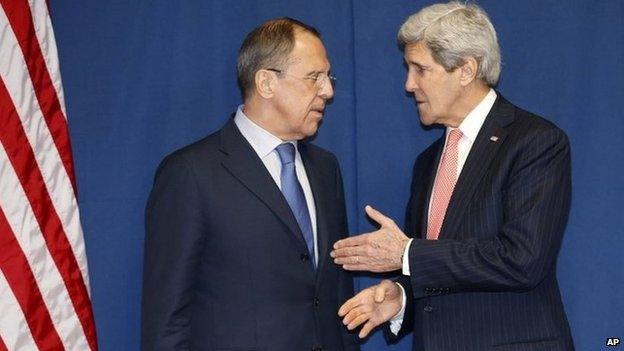US visa restrictions an attempt to prevent escalation
- Published

The US seems to have calculated that a threat of sanctions will not harm Secretary of State John Kerry's talks with Russian Foreign Minister Sergey Lavrov, Mark Mardell writes
Analysis by Mark Mardell, North America editor
The West, in the shape of the EU and the US, is talking about tough action against Russia - but these are threats, not punishment.
They are intended to be a big rock hovering over the head of individuals, forcing them to question their next step in Ukraine.
The White House is being coy about who might be targeted - apparently a list of names is being prepared but right now it is a blank.
We know that the bank balance of the man most responsible for the crisis in Ukraine is not in America's sights.
Russian President Vladimir Putin isn't on any potential blacklist. It's others lower down the food chain who would take the hit.
Visas - and the EU travel ban - are a different story.
Both Ukrainians and Russians are having their US visas revoked. They will be told who they are, although the list won't be made public.
Officials say this is part of making Russia feel the costs of its action - there must be a penalty for the violation of Ukraine's sovereignty.
But this is mostly about the near future, not the recent past. It is not a response to the plan for a referendum in Crimea.
US President Barack Obama's first aim has to be to stop things getting worse - in particular to make sure there's no Russian invasion of Eastern Ukraine.
The second aim must be to get Russia to talk to the government in Kiev about the Crimea - even if the Ukrainians decide to give it away.
Senior administration officials say today's move is a powerful, flexible tool that allows them to escalate their response to what happens on the ground.
They evidently calculate that a threat, rather than actual sanctions, will help, not hinder, US Secretary of State John Kerry's talks with Russian Foreign Minister Sergei Lavrov.
The EU's threat of "far-reaching" consequences of action in "a broad range of economic areas" is far less specific, and far weaker.
This will be blamed on the EU's difficulty in getting agreement.
In fact, while the Poles and the Baltic states might have wanted tougher action, Europe is united in its hesitancy. But the US has demanded, and got, them to join in the threats.
There may be more problems down the line if Russia decides to ignore the big rock and bets that they won't dare pull the lever.